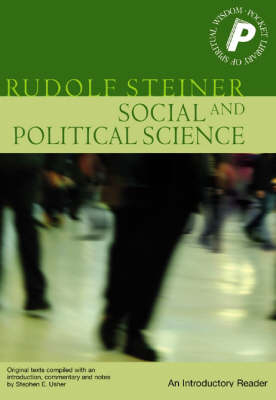
Social and Political Science
Rudolf Steiner Press (Verlag)
978-1-85584-103-1 (ISBN)
- Titel ist leider vergriffen;
keine Neuauflage - Artikel merken
Steiner's original contribution to human knowledge was based on his ability to conduct spiritual research, the investigation of metaphysical dimensions of existence. With his scientific and philosophical training, he brought a new systematic discipline to the field, allowing for conscious methods and comprehensive results. A natural seer from childhood, he cultivated his spiritual vision to a high degree, enabling him to speak with authority on previously veiled mysteries of life.
Topics include: psychological cognition; the social question; the social question and theosophy; Memoranda of 1917; the metamorphosis of intelligence; culture, law, and economy; and Central Europe between East and West.
Rudolf Steiner (1861-1925) was born in the small village of Kraljevec, Austro-Hungarian Empire (now in Croatia), where he grew up. As a young man, he lived in Weimar and Berlin, where he became a well-published scientific, literary, and philosophical scholar, known especially for his work with Goethe's scientific writings. At the beginning of the twentieth century, he began to develop his early philosophical principles into an approach to systematic research into psychological and spiritual phenomena. Formally beginning his spiritual teaching career under the auspices of the Theosophical Society, Steiner came to use the term Anthroposophy (and spiritual science) for his philosophy, spiritual research, and findings. The influence of Steiner's multifaceted genius has led to innovative and holistic approaches in medicine, various therapies, philosophy, religious renewal, Waldorf education, education for special needs, threefold economics, biodynamic agriculture, Goethean science, architecture, and the arts of drama, speech, and eurythmy. In 1924, Rudolf Steiner founded the General Anthroposophical Society, which today has branches throughout the world. He died in Dornach, Switzerland. Stephen E. Usher, Ph.D., is an economist with expertise in money, banking, and financial markets. He received his doctorate from the University of Michigan and served as a staff economist at the Federal Reserve Bank of New York from 1978 to 1980. His tenure overlapped with Paul Volcker, president of the NY Fed until President Carter appointed him Fed Chairman in August 1979. After heading Anthroposophic Press from 1980 to 1988, Mr. Usher joined a premiere international firm of consulting economists (NERA) and specialized in securities and financial markets. Mr. Usher established his own economic consulting business in 1999. He has lectured hundreds of times in business, cultural, and academic settings and taught introductory economics courses at Rockland Community College in New York and principles of money, banking and financial markets at SUNY as adjunct faculty. Mr. Usher has published numerous books.
| Erscheint lt. Verlag | 6.10.2003 |
|---|---|
| Übersetzer | C. Von Arnim |
| Verlagsort | East Sussex |
| Sprache | englisch |
| Themenwelt | Sozialwissenschaften ► Politik / Verwaltung ► Politische Theorie |
| Sozialwissenschaften ► Soziologie ► Allgemeines / Lexika | |
| ISBN-10 | 1-85584-103-7 / 1855841037 |
| ISBN-13 | 978-1-85584-103-1 / 9781855841031 |
| Zustand | Neuware |
| Haben Sie eine Frage zum Produkt? |
aus dem Bereich


